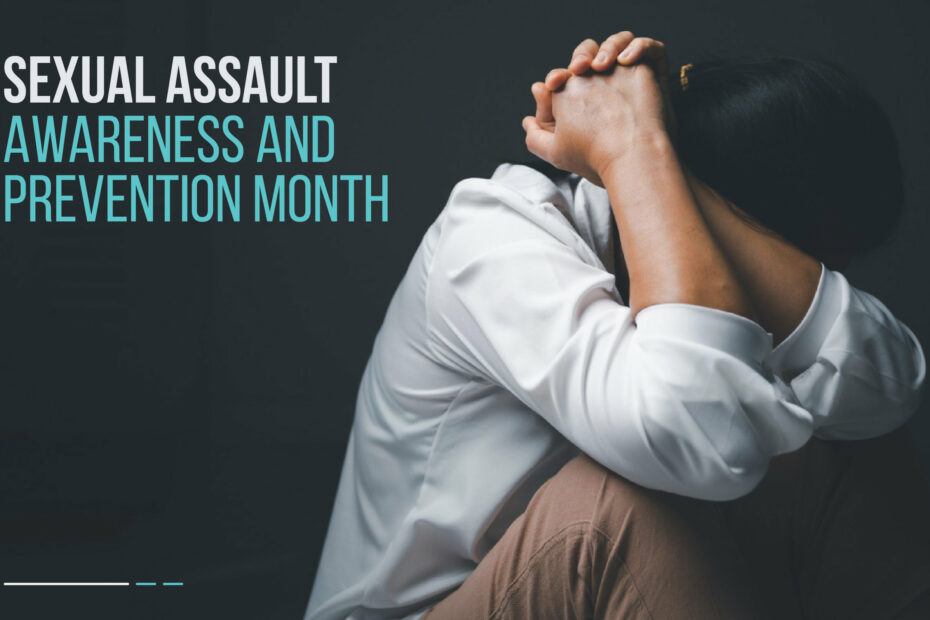“Every April, the National Sexual Violence Resource Center (NSVRC), one of the many leading organizations on NO MORE’s steering committee, coordinates the national Sexual Assault Awareness Month (SAAM) campaign for April to educate and engage the public in addressing this widespread issue.
This year’s SAAM theme is Building Safe Online Spaces Together because sexual harassment, assault, and abuse can happen anywhere, including online. As we connect online, we can learn how to practice digital consent, intervene when we see harmful content or behaviors, and ensure that online spaces — whether they be workspaces, classrooms, social media platforms, or otherwise — are respectful and safe”.
Statistics on sexual assault
- One in five women in the United States experienced completed or attempted rape.
- Approximately a quarter (24.8%) of men in the U.S. experienced some form of contact sexual violence in their lifetime.
- One in three female victims of completed or attempted rape experienced it for the first time between 11 and 17.
- Approximately half (51.1%) of female victims of rape reported being raped by an intimate partner and 40.8% by an acquaintance.
- Nearly one in four undergraduate women experienced sexual assault or misconduct at 33 of the nation’s major universities.
- Over half (52.4%) of male victims report being raped by an acquaintance and 15.1% by a stranger.
- It is estimated that only 19% of rapes, completed or attempted, are reported annually.
- Women and men with disabilities face twice the risk of sexual assault than able-bodied individuals.
Sexual assault and trauma
The short and long-term mental and physical health consequences of sexual assault are well-researched and documented in the literature. Following an incidence of sexual assault, victims are at risk for multiple types of physical injuries (bruises, cuts, injuries to genitalia, broken bones, head trauma, etc.). Sexual assault survivors are at risk of sexually transmitted infections and chronic health problems, including chronic pain. They report a significantly lower health-related quality of life, including dissatisfaction in future romantic relationships, than those who have not been sexually assaulted. Sexual assault victims are also at risk of severe mental health disorders, including panic disorder, post-traumatic stress disorder (PTSD), anxiety, depression, alcohol or drug abuse, acute stress reaction, non-suicidal self-injury, and suicidal behaviors.
The emotional response to sexual trauma may include denial, shock, anger, and fear. These emotional responses can also affect an individual’s memory, concentration, sleep patterns, daily routines, and appetite.
Acute and chronic trauma are categorized according to the type of sexual event an individual experiences. For example, an isolated incident such as rape is considered acute trauma, but continuing events such as ongoing domestic abuse are regarded as chronic trauma. In addition, mental health experts often use the term “trauma spectrum,” a continuum of traumatic events and the responses to these events. Each event is processed differently by each individual, and not everyone will have the same reaction to a traumatic event. For example, some individuals who are sexually abused may go on to develop acute stress disorder, post-traumatic stress disorder, or have minimal long-term emotional and mental effects on a clinical level.
Symptoms of trauma
Both acute and chronic trauma symptoms can vary drastically between individuals, especially between adults and adolescents. The following are symptoms associated with trauma (both acute and chronic):
- Fear
- Anxiety
- Sadness
- Depression
- Anger
- Numbness
- Difficulty concentrating
- Loss of hope
- Difficulty regulating and controlling emotions
- Intrusive memories
- Flashbacks
- Avoidance of emotions, memories, and anything associated with the trauma
- Misusing drugs, alcohol, or food as unhealthy coping mechanisms
- Changes in appetites and weight
- Changes in sleep patterns, insomnia, fatigue
- Nightmares
- Frequent crying or emotional outbursts
- Headaches
- Gastrointestinal side effects (stomach pain, nausea, vomiting, diarrhea)
- Panic attacks
- Being easily startled
Seeking treatment for chronic and acute trauma
The step in helping someone with sexual trauma is placing them in a safe and calm environment where their physical, mental, and emotional needs can be met. This means removing them from the traumatic environment and providing them with shelter, food, clothing, and medical attention (if needed). Once the individual is placed in a safe and calm atmosphere, the necessary mental health treatment approaches can begin. These often include a combination of psychotherapy and medications. Cognitive-behavioral therapy is the most common psychotherapy approach used to help individuals who have experienced acute or chronic trauma. Seeking cognitive behavioral therapy from a licensed therapist is necessary if the trauma event and associated symptoms begin to interfere with your daily functioning and day-to-day activities. Medications are often used to help relieve traumatic event symptoms and treat any underlying co-occurring disorders such as depression or anxiety.
Lifestyle changes for trauma are also significant. These include adopting a healthy physical exercise routine, eating balanced and nutritious meals, adopting a regular and healthy sleep routine, spending time with supportive loved ones, meditating, journaling, and developing creative outlets.
About AKUA Mind and Body
AKUA Mind and Body is a full-service addiction and mental health treatment center with multiple locations across California. We believe in treating the individual and not just the disorder and have a team of mental health experts who have experience in treating trauma and trauma-related disorders and any underlying co-occurring disorders. No matter the range or severity of symptoms or the type of traumatic event you experienced, your experience is valid. Our team at AKUA Mind and Body wants to help you navigate through this challenging journey and seek out a healthy and successful recovery.




